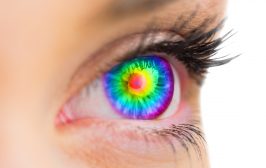-
See the Difference: Save $1,000 on LASIK , Find More
*Must mention this promotion and be treated in November of 2024 to qualify. $1,000 off for both eyes on standard Wavelight price, $500 off for one eye. Cannot be combined with any other offers.
Twitching Eye: What Does It Mean?
Updated: July 16, 2024
It happens to everyone at some point in their lives; you could be sitting in a movie theater, driving to work, or just relaxing on the couch when all of a sudden your eye starts to twitch.
Eye twitching (or myokymia) is an involuntary eyelid muscle contraction, which typically affects your lower eyelid, not your actual eyeball. An eye twitch (while albeit annoying) is usually nothing serious. These spasms are pretty common and may come and go, without an identifiable trigger.
So, what exactly makes your eye twitch to begin with?
The exact cause of eye twitching is unknown- but some people experience eye twitching more frequently when they are under stress, don’t get enough sleep, drink too much caffeine, or suffer from allergies.
Superstitions tell us that the left eye twitching means something bad is going to happen in our lives, while the right eye twitching means something good is about to happen. Science, however, provides us with far more grounded answers.
Here’s a closer look at some of the reasons why your eyes might be twitching, and what you can do about it.
For most people, eye twitches have a simple root cause, and are easy to correct without any medical intervention.
What Is Eye Twitching?
Eye twitching, also known as eyelid twitching or blepharospasm, is a common condition characterized by involuntary spasms or twitches of the muscles around the eyelids. The twitching can range from mild to severe and can affect one or both eyes. While eye twitching is usually not a serious medical condition, it can be bothersome and uncomfortable. In some cases, it can also be a sign of an underlying medical issue that requires attention. Understanding the causes, symptoms, and treatments of eye twitching can help individuals better manage the condition and alleviate any associated discomfort.

3 Types of Eye Twitches
Usually, eye twitching will fall into one of these three categories:
-
Minor Eye Twitch: A minor eye twitch is typically triggered by factors like the ones listed above, (stress, alcohol, sleep deprivation) and will go away on its own after a few hours.
-
Benign Essential Blepharospasm: Blepharospasm is an abnormal, but non-life-threatening twitching, resulting from dry eyes, Tourette’s syndrome, and other conditions.
-
Hemifacial Spasm: A more violent type of eye twitching, which sometimes involves the entire side of the face, and may even affect things like talking and eating. Hemifacial spasms are usually caused by inflamed facial nerves, but may also result from a serious neurological problem. This type of spasm is often treated with muscle-relaxing injections or medications, so be sure to talk to your doctor right away if you’re experiencing this type of twitching.
Common Causes of Eye Twitching
Allergies Can Cause Eye Twitches
People with hayfever and those who are allergic to dust might also experience twitching of the eye occasionally. This usually subsides when other symptoms disappear.
Caffeine Can Cause Eye Twitches
Whether you’ve been downing a few extra espresso drinks to get you through those busy days or sipping on tea and soda all day, the extra caffeine intake could be affecting your nervous system and making your eyes twitch. Try to scale back on the caffeine, so your body can relax naturally.
Digital Eye Strain or Computer Vision Syndrome Can Cause Eye Twitches
Although we may not think about it, working at a computer all day or spending a lot of time focusing on a tablet or smartphone screen can put tons of extra stress on your eyes. If you need to be at a computer for extended periods of time, get into a routine of taking frequent breaks. Even relaxing with your eyes closed for three to five minutes can be enough to reduce digital eye strain or computer vision syndrome and related eye spasms.
Fatigue or Tiredness Can Cause Eye Twitches
If your hectic schedule hasn’t allowed for much sleep lately, you might find your eyes twitching more frequently. The Mayo Clinic identifies lack of sleep as one of the causes of eyelid spasms. Jenepher K. Piper, the primary care practitioner at Mercy Medical Center in Baltimore, told The Atlantic in a recent interview: “Fatigue means that your muscles aren’t getting enough nutrients… being low in vitamin D or magnesium can [lead to] difficulty with relaxing one’s muscles, so they kind of tense up or twitch.”
Nutritional Deficiency Can Cause Eye Twitches
Some reports suggest a lack of certain nutritional elements, such as magnesium, can trigger eyelid spasms. Although these reports are not conclusive, this may be another possible cause of eye twitching. If you are concerned that your diet may not be supplying all the nutrients you need for healthy vision, discuss this with your eye doctor before purchasing over-the-counter nutritional supplements.
Alcohol Consumption Can Cause Eye Twitches
Anyone who’s ever had too much to drink can attest to the blurry, distorted vision it can cause. But did you know that drinking too much alcohol can also cause eye twitching? A study done by the Hallym University College of Medicine suggests that excessive alcohol consumption “can increase and exacerbate symptoms of dry eye” increasing the chances of getting eye twitches.
Drinking a glass of water between alcoholic beverages, as well as knowing your limit can be very helpful for the health of your eyes, and your overall health.
Other causes of minor eye twitching can include eye irritation, emotional stress, bright lights and even climate. In other words, an eyelid twitch may just be your body’s way of saying, “Take better care of me!”
Eye Twitching Symptoms
The most common symptom is a repetitive, involuntary twitching of the eyelid. This can occur in one or both eyes, and the twitching can range from mild to severe. In some cases, the twitching can be so pronounced that it interferes with vision or causes discomfort. Other symptoms of eye twitching can include sensitivity to light, dry or irritated eyes, and a feeling of fullness in the eyelid. If you are experiencing any of these symptoms, it is important to seek medical attention to rule out any underlying conditions and find effective treatments for your eye twitching.
Eye Twitching Diagnosis: When To See a Doctor About Your Eye Twitching
If your eye twitching doesn’t go away in a few days or feels like it’s getting worse, you should make an appointment to see your eye doctor.
Diagnosing eye twitching involves a thorough evaluation of the patient’s symptoms, medical history, and lifestyle factors. The doctor will ask the patient about their symptoms, including when they began and how often they occur. They may also perform a physical exam, including an eye exam, to check for any underlying conditions that could be causing the twitching. In some cases, the doctor may order additional tests, such as blood tests or an electromyography (EMG), to measure the electrical activity of the muscles around the eye. By identifying the underlying cause of the eye twitching, doctors can develop an effective treatment plan to alleviate the symptoms and improve the patient’s quality of life.
It is very rare that eye spasms are from a serious issue- but it’s not impossible. Very rarely, eyelid spasms are caused by a more serious brain or nerve disorder.
Chronic muscle spasms or frequent eye twitching may require some treatment. Talk to your eye doctor if you are concerned about eye twitching, or the overall health of your eyes.
How To Stop or Prevent Eye Twitching
Eye twitching, also known as eyelid twitching or myokymia, can be a bothersome condition. Understanding the underlying causes of eye twitching can help you identify ways to prevent and alleviate the condition. Some of the common causes of eye twitching include:
- Fatigue
- Stress
- Caffeine
- Alcohol
- Smoking
- Light sensitivity
- Some medications
If you’re looking for ways to stop or prevent eye twitching, or want to explore effective remedies, read our full article here.
A Word From LasikPlus on Eye Twitching
Another reason you may be experiencing eye twitching is the dryness associated with wearing contacts. As explained by WebMD and the American Board of Ophthalmology, sometimes when your eyes are too dry, you’ll experience random and annoying eye twitching.
It’s no secret that wearing contacts can make your eyes dry and irritated, so If you still wear contact lenses, try to avoid this dryness and irritation by keeping your lenses clean and moisturized.
A simple solution to eye twitching and dryness caused by contacts would be to just get rid of them altogether! Talk to one of our eye care specialists today about how you can get rid of your pesky contacts once and for all, and give yourself the gift of 20/20 vision from LasikPlus.
Call us at 1.866.755.2026 – or go online to schedule an appointment to go over all of your vision options with our knowledgeable team!
YOU MIGHT ALSO LIKE...
VISION CENTERS NEAR ME
Enter your zip code, city, or a doctor name below to find a vision center.
Find out if LASIK is right for you
Congratulations!
Your vision issues can most likely be corrected with a LASIK procedure. Schedule a free consultation today.
Answer 5 simple questions to see if you are a candidate
What is your age group?
Do you wear...
With corrective lenses, do you have...
Have you ever been told that you have astigmatism?
Have you ever been told that you have dry eyes?
Request an Information Kit
Learn about your surgeon, the latest advanced technology, procedures, options and benefits, financing options, and what to expect from your LASIKPlus experience.









